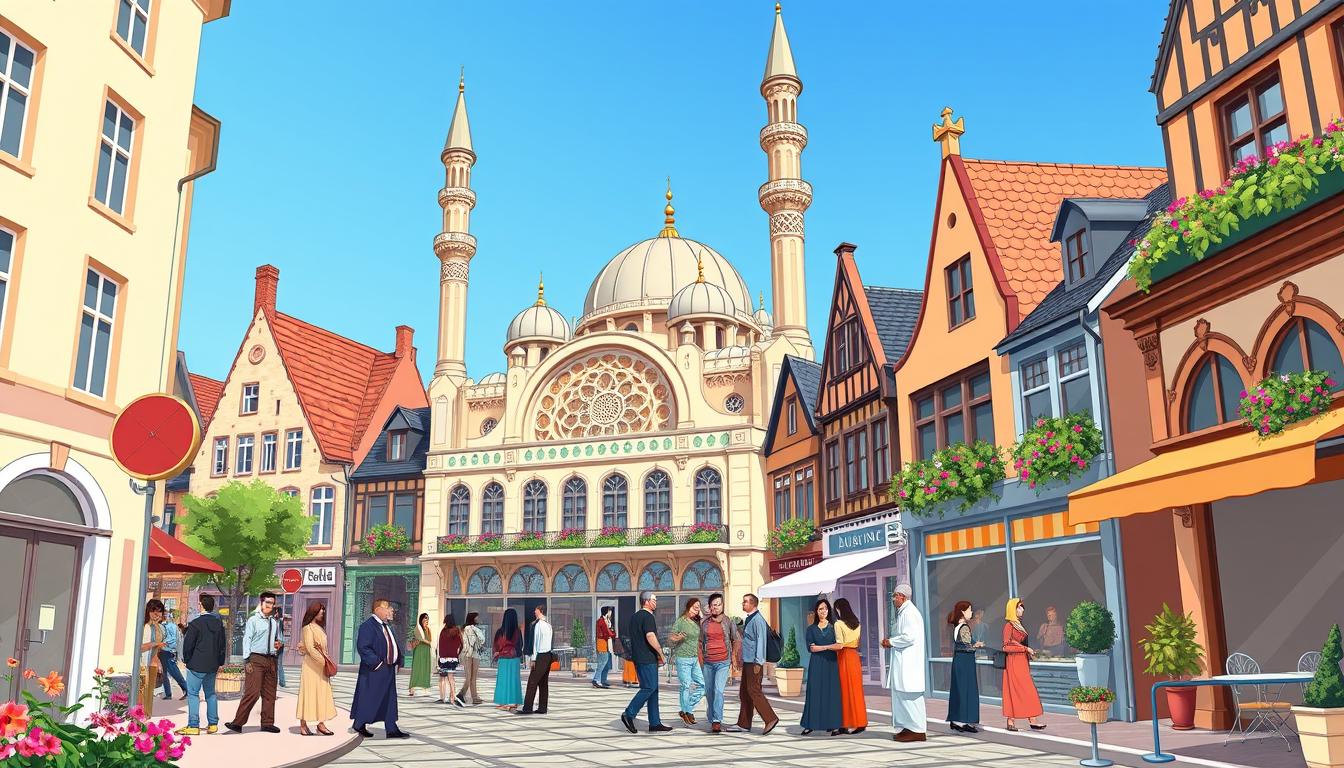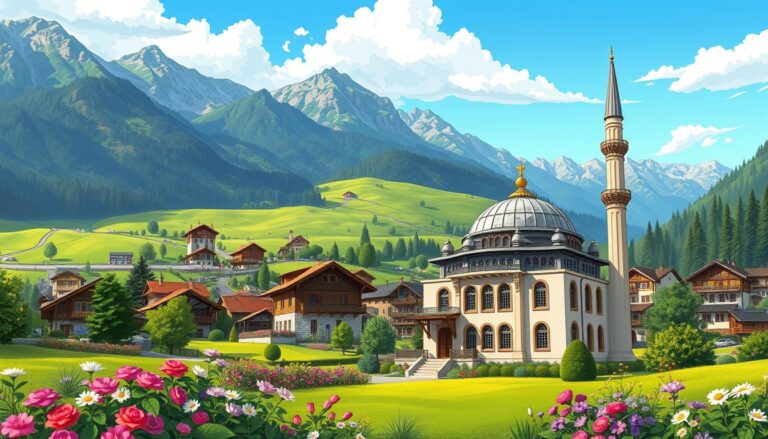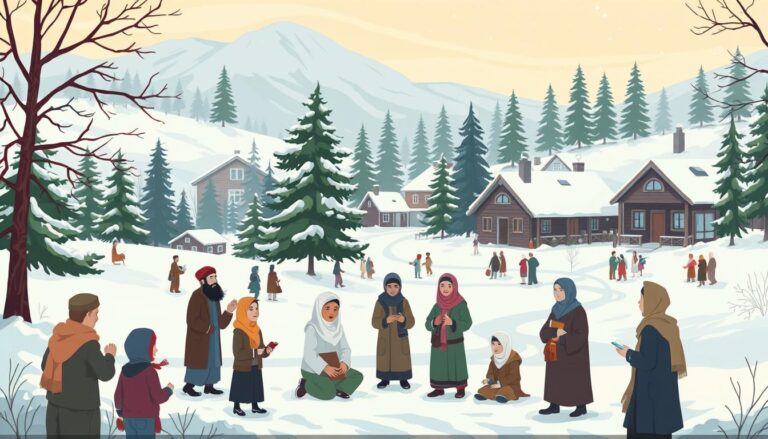Islam in Belgium
Islam is the second-largest religion in Belgium, with an estimated 4.0% to 7.6% of the country’s population adhering to the faith. While the exact number of Belgian Muslims remains uncertain, it is clear that their presence has grown significantly since the 1960s, with over 500,000 individuals identifying as Muslim today. This vibrant community represents around 20% of the population in the capital city of Brussels, underscoring the substantial impact that Islam has had on the cultural fabric of Belgium.
Key Takeaways
- Islam is the second-largest religion in Belgium, with an estimated 4.0% to 7.6% of the population identifying as Muslim.
- The Belgian Muslim community is diverse, with a majority of Sunni adherents and a significant Shia population of around 10%.
- Approximately 40% of Belgian Muslims reside in Brussels, with the remainder spread across the Flanders and Wallonia regions.
- Belgian Muslims face economic and social challenges, including higher unemployment rates and lower access to higher education compared to their non-Muslim counterparts.
- The Muslim community in Belgium has a strong presence, with over 350 mosques and the government employing over 800 Imams and teachers to serve the community.
Introduction to Islam in Belgium
The history of Islam in Belgium dates back to 1829, a year prior to the country’s independence. Over the decades, the Muslim population in Belgium has steadily grown, driven by labor immigration agreements and the arrival of Belgian Muslim immigrants. Today, Belgium is home to a diverse and vibrant Islamic community, with its unique history and demographic landscape.
Overview of the Muslim Population and History in Belgium
In 1964, Belgium signed bilateral labor immigration agreements with Turkey and countries in the Maghreb region, leading to the arrival of over 10,000 workers from these nations. These immigrants primarily filled low-skilled jobs. However, this influx of foreign labor came to a halt in 1974 when Belgium banned the entry of all foreign manual workers.
The significance of this period lies in the official recognition of Islam as a religion in Belgium in the same year. This recognition paved the way for the growth and integration of the Muslim community within the Belgian society.
Today, the Muslim population in Belgium is estimated to be between 320,000 to 450,000, representing approximately 4% of the country’s total population. The Muslim community in Belgium is characterized by its diversity, with significant concentrations in the capital city of Brussels and other industrial areas in the French-speaking south.
“The Muslim population in Belgium is estimated to be between 320,000 to 450,000, which represents about 4% of the total population of the country.”
The young age profile of the Muslim population in Belgium is another notable aspect, with around 35% of Turks and Moroccans being below 18 years old, compared to 18% of native Belgians. This demographic shift has significant implications for the future of the Belgian Muslim community and its integration into the broader society.
Demographics of Belgian Muslims
The Muslim population in Belgium is unevenly distributed, with the majority concentrated in the working-class districts of major cities. According to recent data, almost 40% of Belgian Muslims live in the capital, Brussels, while approximately 39% live in Flanders and 21% in Wallonia.
Determining the exact ethnic composition of Belgian Muslims is challenging, as religious censuses are forbidden in the country. Nationality cannot be used as an indicator of religion, as most people with roots in Islamic countries have taken on Belgian citizenship, and their children are born Belgian citizens.
Islam represents the second-largest religion in Belgium, with an estimated 250,000 to 400,000 individuals having a Muslim background. This population accounts for around 5% of the total Belgian population, which is estimated at 11.9 million people as of midyear 2023.
Regional Distribution of Belgian Muslims
- Approximately 42.2% of Muslims reside in Flanders, the northern region of Belgium.
- In Brussels, the capital city, 35.5% of the population is estimated to be Muslim.
- The remaining 22.3% of Belgian Muslims live in Wallonia, the southern region of the country.
The Muslim population in Brussels is particularly concentrated in neighborhoods such as Molenbeek and Schaerbeek, but it is also widely spread throughout the city.
Branches and Denominations of Islam in Belgium
Belgium’s Muslim population is primarily composed of Sunni Muslims, who account for the vast majority. However, the country also hosts a sizable Shia Muslim community, as well as a smaller Ahmadiyya presence. This diversity reflects the global distribution of Islamic sects, with Sunni Islam dominating the global Muslim landscape and Shia Islam representing a significant minority.
The Sunni Muslim population in Belgium is estimated to make up over 90% of the total Muslim community. Sunni Islam, which follows the teachings of the Prophet Muhammad and the first four caliphs, is the largest branch of Islam worldwide, accounting for 87-90% of Muslims globally.
The Shia Muslim community in Belgium, on the other hand, is estimated to be around 10% of the total Muslim population. Shia Islam, which emerged after the death of the Prophet Muhammad, is the second-largest branch of Islam, representing 10-13% of Muslims globally. The rise of Shiism in Belgium can be attributed to the arrival of Shia Muslims from countries such as Lebanon, Iraq, and Iran.
The Ahmadiyya community, a Islamic movement founded in the late 19th century, has a small presence in Belgium. Ahmadis are a minority within the Muslim faith, with an estimated global population of 10-20 million, or less than 1% of the worldwide Muslim population.
This diversity of Islamic sects and denominations in Belgium reflects the country’s multicultural landscape and the rich tapestry of Muslim communities that have settled there over the years.
“The diversity of Islamic sects and denominations in Belgium reflects the country’s multicultural landscape and the rich tapestry of Muslim communities that have settled there over the years.”
The Rise of Shia Islam in Belgium
Shia Islam has been steadily gaining a foothold in Belgium, with the arrival of Shia Muslims from countries like Lebanon, Iraq, and Iran. Initially, the Shia presence was concentrated in the capital, Brussels, and the city of Antwerp, but it has now spread to other parts of the country. The estimated Shia population in Belgium is over 10,000, with the majority hailing from Lebanon, Iran, Syria, and Iraq.
Major Shia Islamic Centers and Mosques in Belgium
The Shia Muslim community in Belgium has established five active Islamic centers and mosques, which serve as hubs for religious, cultural, and social activities. These include the Ahl al-Bayt Center, the Center of Thaqalain, Al-Rahman Mosque, Al-Huda Mosque, and the Imam Reza Mosque, where Friday prayers are regularly held.
These Shia mosques in Belgium play a vital role in catering to the diverse religious, political, ethnic, and linguistic backgrounds of the Shia population. They serve as a platform for the community to maintain their Shia Islamic identity and engage in various religious and social activities.
“The rise of Shia Islam in Belgium is a testament to the country’s growing diversity and the resilience of the Shia Muslim community.”
The Shia Muslim centers in Belgium have also established transnational connections with their societies of origin, allowing for the exchange of religious, cultural, and political ideas. This has influenced the dynamic within the European Shia diaspora communities, as they navigate their identities and the challenges faced in their host country.
Identity and Sense of Belonging among Belgian Muslims
A 2011 study by the Open Society Foundation found that Belgian Muslims, even those born in the country, often feel like outsiders or “foreigners” in their own homeland. The study, which focused on Muslims in the city of Antwerp, revealed a complex dynamic of identity and belonging.
While the majority of Muslim respondents (90%) expressed a strong sense of belonging to the city of Antwerp, only about half (54%) viewed themselves as truly Belgian. This disconnect suggests that Belgian Muslim identity and the sense of belonging among Belgian Muslims are nuanced and multifaceted.
The study highlighted that individuals with a Moroccan or Turkish background, even those born and raised in Belgium and fluent in Dutch, often felt the least accepted by the broader Belgian society. This underscores the ongoing challenges of Muslim integration in Belgium and the need for greater social cohesion.
“Only one-third of Muslim respondents felt that others viewed them as Belgian, despite the majority considering themselves Belgian.”
The search for identity and belonging is a common theme among young Belgian Muslims, who may be drawn to a deeper understanding and practice of Islam in response to a perceived culture of materialism and racism in their communities. Education is seen as a key factor in shaping the religious and cultural identity of this demographic.
Overall, the findings suggest that the Belgian Muslim identity and sense of belonging are complex issues that require nuanced understanding and targeted efforts to foster greater integration and inclusion within Belgian society.
Islam in Belgium
Religiosity and Cultural Identity of Belgian Muslims
The religiosity of Belgian Muslims has been a topic of increasing interest in recent years. Surveys conducted in 1994 and 1996 observed an uptick in religious practices among Belgian Muslims, with more frequent mosque attendance, increased frequency of prayers, and greater importance placed on religious education, particularly among younger Muslims. This trend suggests a growing sense of religious identity and commitment within the community.
However, more recent studies indicate that while participation in religious activities is on the rise, Belgian Muslims are also increasingly identifying with Islam as a cultural and social marker, beyond just religious observance. A 2005 study estimated that around 87% of the Muslim population in Belgium are “practicing Muslims,” highlighting the deep-rooted nature of Islamic faith and traditions within the community.
“The rise in religiosity among Belgian Muslims reflects a complex interplay between their religious and cultural identities, as they navigate their place within Belgian society.”
The cultural identity of Belgian Muslims is also evolving, as they strive to reconcile their Islamic heritage with the diverse, multicultural fabric of Belgian society. This delicate balance is an ongoing challenge, but it also presents opportunities for enriching the cultural tapestry of the country.
The diverse religious and cultural landscape of Belgian Muslims is a testament to the dynamic nature of their integration and adaptation within the broader Belgian context. As the country continues to grapple with questions of identity and inclusion, understanding the complexities of Muslim religiosity and cultural identity will be crucial in fostering a more cohesive and inclusive society.
Economic Status and Education of Belgian Muslims
The economic status of Muslims in Belgium lags behind that of non-Muslim Belgians. Studies have found higher unemployment rates among Turkish and Moroccan Belgians, ranging from 29% to 38%. Moreover, Muslims are underrepresented in higher-earning jobs and overrepresented in lower-paying positions compared to ethnic Belgians.
The education level of Belgian Muslims is also lower than the national average. Only 6-13% of Muslims in Belgium have a university degree, indicating a significant disparity in access to higher education. A 2009 analysis of the European 2006 PISA survey revealed that the inequality between minorities, including Muslims, and native Belgian students was one of the highest in Europe, which was attributed to a “high degree of segregation in Belgian cities.”
Challenges Faced by Muslim Communities
The challenges faced by Muslim communities in Belgium in terms of employment and higher education are multifaceted. Economic inequality between minorities and native Belgians, as well as high levels of discrimination in the job market, contribute to the disparities in the economic status of Belgian Muslims. Additionally, the lack of local interpretations of Islam and the welfare system’s role as a potential barrier to civic integration have been identified as factors influencing the educational and economic outcomes of the Muslim population.
“Unemployment rates among Turkish Belgians and Moroccan Belgians were between 29% to 38%.”
- Underrepresentation of Muslims in higher-earning jobs
- Overrepresentation of Muslims in lower-paying positions
- Only 6-13% of Muslims in Belgium have a university degree
- High levels of discrimination in the job market
- Lack of local interpretations of Islam and welfare system barriers to civic integration
Cultural Aspects of Belgian Muslim Communities
The cultural identity of Belgian Muslims is a vibrant tapestry woven with diverse threads of tradition and modernity. Despite their minority status, Muslim communities in Belgium have managed to preserve and express their cultural practices, music, and art, while also adapting to the Belgian way of life.
According to a 2011 study, the three most popular music styles among Muslims in Belgium were Nasheed, Al-Andalus (a Moroccan musical genre), and hip hop. This suggests that Belgian Muslims are maintaining and expressing their cultural identity through music and art, while also integrating aspects of Belgian and Western culture.
The Muslim cultural practices in Belgium are equally diverse, ranging from traditional celebrations and festivals to the incorporation of Islamic principles into daily life. From the observance of Ramadan and Eid to the preservation of culinary traditions, Belgian Muslims have found ways to blend their religious and cultural identities seamlessly.
The artistic expressions of Belgian Muslims extend beyond music, with vibrant displays of calligraphy, textile art, and architecture adorning the landscape. The intricate designs and patterns found in Islamic art can be seen in the decor of mosques, community centers, and private homes, reflecting the deep-rooted cultural identity of this community.
“The cultural diversity of Belgian Muslims is a testament to their resilience and adaptability. They have managed to maintain their traditions while embracing the richness of their adopted homeland.”
As the Muslim population in Belgium continues to grow, the cultural identity of these communities will undoubtedly evolve, creating a unique and dynamic tapestry that celebrates the intersection of Islamic and Belgian cultural practices and artistic expressions.
Political Representation and Participation of Belgian Muslims
The Muslim community in Belgium has made significant strides in political representation and participation in recent years. Two members of the Belgian federal government formed after the 2014 elections have a Muslim background, indicating a growing political voice for the country’s Muslim population.
However, the data suggests that Belgian Muslims face challenges when it comes to civil society institutions. Despite their strong presence in government, there is a lack of organizations that actively fight for civil rights and oppose discrimination within the community.
According to a 2018 survey, Muslims make up approximately 6.8% of Belgium’s total population, with the majority residing in the Flanders region (42.2%) and the Brussels capital region (35.5%). The Muslim political representation in Belgium is still relatively low compared to the overall population, but the community’s participation in the country’s political processes is gradually increasing.
“Belgian Muslims have two national senators and five representatives in the lower house of parliament, indicating a strong political representation.”
The Belgian government provides financial support to officially recognized religious groups, including direct payment of clergy salaries and pensions, maintenance and equipment costs for places of worship, as well as oversight of finances and donations. This suggests that the integration of Muslim political participation in Belgian politics is an ongoing process that requires further development.
While the Muslim community’s political representation is noteworthy, the lack of civil society organizations advocating for civil rights and opposing discrimination within the community remains a challenge. The integration of Muslim political participation in Belgian politics is an important step, but more work is needed to ensure the full and equal representation of Belgian Muslims in the political sphere.
Controversies and Challenges Faced by Belgian Muslims
Belgian Muslims have faced a range of controversies and challenges in recent years, including issues related to the face-covering ban and incidents of discrimination. In 2011, the Belgian government instituted a ban on the wearing of face-coverings, such as the niqāb and burqa, in public spaces. This decision was met with opposition from some Belgian Muslim communities, who saw it as an infringement on their religious and personal freedoms.
The face-covering ban has been challenged in both the Belgian Constitutional Court and the European Court of Human Rights (ECHR), but it has ultimately been upheld. This issue has highlighted the ongoing tension between concerns about national security and the preservation of individual liberties within the Belgian Muslim community.
Alongside the face-covering ban, there have also been reports of violence, threats, harassment, discrimination, and hate speech directed towards Muslim and Jewish communities in Belgium. These incidents have raised concerns about the level of acceptance and integration of minority groups within Belgian society.
“The jihadi message can be tempting to vulnerable youths due to unemployment, marginalization, and the appeal of jihad.”
The challenges faced by Belgian Muslims are multifaceted, with issues such as unemployment, marginalization, and the influence of online extremist propaganda also playing a role. Unemployment rates, particularly among younger members of the Muslim community, have been a significant concern, with some regions like Molenbeek experiencing youth unemployment rates exceeding 40%.
These socioeconomic factors, combined with a perceived lack of opportunities and integration, have made some individuals more vulnerable to the influence of extremist ideologies. As a result, Belgium has grappled with the issue of its citizens being lured into joining terrorist organizations, such as the Islamic State, with a disproportionately high number of Belgian Islamists hailing from the capital, Brussels.
Conclusion
Belgium is home to a significant Muslim population, with estimates ranging from 4.0% to 7.6% of the country’s total population. The Muslim community in Belgium is diverse, with a majority being Sunni Muslims and a smaller Shia and Ahmadi presence. While Belgian Muslims have a strong political representation, they face challenges in terms of economic status, education, and integration into Belgian society. The country has also faced controversies, such as the face-covering ban and incidents of discrimination and hate speech against the Muslim community.
The statistics reveal that a small minority represents the radical form of Islam in Belgium, with an increasing number of mosques and Islamic centers under the influence of Wahhabism, a form of Salafism. The Great Mosque of Brussels has been mentioned as significant in the spread of Wahhabism, with financial support from Saudi Arabia. This has led to concerns about the promotion of practices like the wearing of the niqab, which is prohibited by Belgian law.
Overall, the Muslim community in Belgium continues to navigate its identity and place within the broader Belgian society. The summary of Islam in Belgium and key takeaways on the Belgian Muslim community highlight the complexities and challenges faced by this diverse population. As Belgium strives to address these issues, it will be crucial to strike a balance between upholding the values of integration and respecting the religious and cultural identity of its Muslim citizens.
Source Links
- Islam in Belgium
- Belgium’s Muslim Beggars
- Islamic Radicalization in Belgium
- Islam in Belgium –
- ISLAMIC RADICALIZATION IN BELGIUM
- Belgium – United States Department of State
- 2016 Brussels attacks: On anniversary, Muslims remain stigmatised
- Belgium Religions – Demographics
- No title found
- Mapping Shia Muslim Communities in Europe: Local and Transnational Dimensions An Introduction to the Special Issue
- Project MUSE – Radicalization in Theory and Practice
- Sean DeLacey on Muslim Identity in Belgium
- Strong Sense of Belonging Among Antwerp’s Muslim Community Jeopardized by Official Policies
- Psychological Well-Being, Multiple Identities, and Discrimination Among First and Second Generation Immigrant Muslims
- Being “Both”: Identifications of Second and Third Generation Brussels Muslim Youths towards the Country of Origin and the Country of Residence
- "’Churches Can, Mosques Can’t’: Race, Immigration, and Islam in Belgium" by Hafsa Oubou – Canopy Forum
- Microsoft Word – Belgium – Muslims in EU – final for pdf, without cover.doc
- Belgium – United States Department of State
- Toxic mix that makes Belgium fertile ground for terrorism | CNN
- Opinion | The Islamic State of Molenbeek (Published 2016)
- Brussels explosions: Why has Belgium’s capital been attacked?
- Belgium: Spread of a radical form of Islam is investigated
- Concentration of Muslim populations and structure of Muslim associa…







